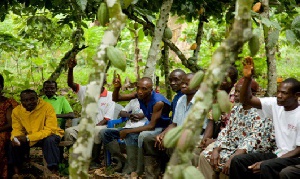Some selected farmers in the Bawku area were on Thursday schooled by management of the Savannah Agriculture Research Institute (SARI) on how to effectively select high yielding parasite resistant crops to grow.
The workshop, which was funded by the International Treaty, Plant Genetic Research (ITPGR) and the Food and Agriculture Organization (FAO), was aimed at releasing a striga resistant and draught tolerant early maturing and high yielding cowpea to farmers in the area.
The striga is a weed plant and could be found mostly in the three northern regions. It lives within crops and feeds solely on the nutrients either in the crop or denies the crop from getting access to the nutrients thereby making the crops malnourished and withers later.
The training equipped the 350 farmers with the needed knowledge to identify parasite infested crops and encouraged the farmers to patronize the cowpea since it could resist various crop parasites including the striga which depended solely on crops to survive.
In view of its potency against diseases and infections as well as being tolerant to draught, the University of Cape Coast (UCC), College of Agriculture and Natural Sciences, Department of Molecular Biology and Biotechnology, in collaboration with the Council for Science and Industrial Research (CSIR) and the Savannah Agricultural Research Institute (SARI) recommended the cowpea to the farmers.
Dr Aaron Tettey Asare, a Biotechnologist at the UCC in charge of the cowpea project, said research findings in the past nine years has shown that the striga is a threat to the growth of many crops such as maize, sorghum among others, and said it is proper to inter-crop the cowpea which is resistant to striga with other crops to enable them grow well.
He said the project is geared at fighting the challenges that farmers go through adding that since the cowpea is a serious economic variety and could withstand other environmental hazards, it would be proper for them to focus on cropping it to boost their socio-economic lives.
He described the cowpea as draught tolerant, contains soil nutrients and could grow under difficult weather conditions to produce good yields.
Dr Asare, however, cautioned the farmers to beware of the level of attention the cowpea needed during cropping.
Dr Francis Kusi, officer in charge of SARI at Manga, said the Institute had adopted this measure for farmers to get good yields during harvest.
He said the cowpea when planted with the best practices would give good harvest because it could withstand all kinds of diseases during maturity age.
Dr Kusi said when the cowpea is planted earlier before the other crops, it could challenge the striga and allow the crops to grow better, and mature early for the farmer.
He called on the participants drawn from the Binduri, Pusiga, Garu-Tempane and the Bawku West Districts to attend to the lessons of the workshop.
Business News of Saturday, 16 September 2017
Source: ghananewsagency.org













